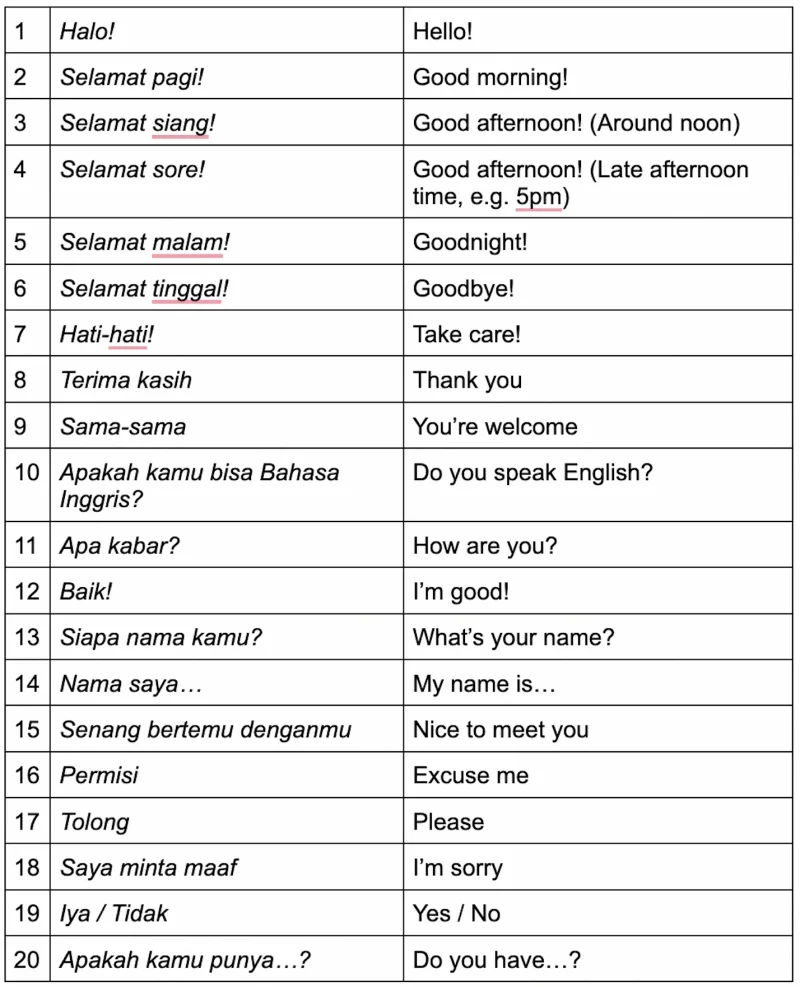Languages in Bali : An Easy Guide To International Adventurers
What Language is Spoken in Bali?
1. Indonesian (Bahasa)

Source Image : Tripzilla
Indonesian (Bahasa Indonesia) serves as a lingua franca that bridges the diverse ethnic groups scattered across the islands.
Its widespread use in education, media, and government makes it the most commonly understood language in Bali, facilitating communication among Indonesians of different linguistic backgrounds.
2. Balinese
Source Image : Tripzilla
The Balinese language, or Bahasa Bali, is the mother tongue of the Balinese people, embodying the island’s rich cultural heritage.
Though its use is more prevalent in rural areas and within traditional ceremonies, Balinese remains a crucial component of the island’s identity.
It features various dialects and levels of speech, which are used based on the social status and relationship between speakers, reflecting the island’s complex social hierarchy.
3. English
English has gained a stronghold in Bali, primarily due to the tourism industry.
It is widely spoken in tourist areas like Canggu and Seminyak, making it a convenient means of communication for international visitors.
Additionally, the prevalence of English facilitates a smooth travel experience for those who are not familiar with Indonesian or Balinese.
Similarities and Differences Between Balinese and Indonesian Language
1. Similarities

Source Image : Unsplash
Balinese and Indonesian languages share a common Austronesian lineage, which is evident in their structural similarities.
Both languages use a Latin-based alphabet and have similar grammatical rules, such as the use of prefixes and suffixes to alter word meanings.
They also share vocabulary, particularly basic words and phrases, due to the historical influence of Malay, which has contributed to the linguistic development of the region.
2. Differences
Despite their shared heritage, Balinese and Indonesian differ markedly in several aspects:
Phonetics and Pronunciation: Balinese language features a more complex system of phonemes, including unique consonant clusters and vowel sounds that are not found in Indonesian.
Honorific Language: Balinese incorporates a system of honorifics that reflect the societal hierarchy and religious practices unique to Bali. This aspect of linguistic respect is less emphasized in Indonesian.
Cultural Specificity: The Balinese language is replete with terms that pertain exclusively to Balinese culture, religion, and traditions, underscoring the deep connection between language and local identity.
Indonesian and Bali Language Basics: Both Indonesian and Balinese languages utilize the Latin alphabet. However, the Balinese also have their own traditional script known as Aksara Bali, which is primarily used for religious texts and cultural ceremonies.
Word Examples and Meanings
Here are a few basic words in Indonesian and Balinese for travelers:
Hello:
Hello in Indonesian: “Halo” / HelloBalinese: “Om Swastiastu” (a greeting with religious connotations)
Thank You:
Thank You in Indonesian: “Terima kasih” / Thank You in Balinese: “Suksma”
Yes/No:
Indonesian: “Ya”/”Tidak” / Balinese: “Inggih”/”Tidak” (Balinese uses the same word for ‘no’ as Indonesian)
Of course, understanding these basics can enhance your interaction with locals, showing respect and appreciation for their culture.
While navigating Bali’s linguistic landscape may seem daunting at first, a little knowledge goes a long way in enriching your travel experience on this enchanting island.
If you want to go on a trip to Bali, you can visit the best beach club in Bali, Atlas Beach Club, visit here for more info!
Read More : Local Markets in Bali – Full Best Market Guide
FAQ
How do you greet people in Bali? When you go to Bali, it’s important to know how to say hello politely. In Balinese, you can say “Om Suwastiastu.” This phrase is more than just a hello.
The local language of Bali is Balinese. However, everybody on the island can speak the national language; Bahasa Indonesia. Besides speaking the language, it’s also important to observe some local etiquette and mind your manners so you don’t offend the locals: Always dress and act modestly.
Balinese, or Basa Bali, on the other hand, is a language that’s quite different from the national language as it has a more Malayo-Polynesian origin. The language that best resembles Balinese is Javanese, as compared to Bahasa Indonesia.
Matur Suksma. You can thank someone in Balinese by saying “suksma,” which translates as “thanks.” For a more polite version, you could say “terima kasih” for “thank you,” or “matur suksma” for “thank you very much.”
You can just say ‘Terima Kasih’ also a polite way of saying no thank you it is how a lot of locals say it.. If someone is really over the top hassling you and wont take your polite ‘no’s’ say Jangan!
Other Articles
Where is Bali? Bali is a small island that has an incomparable uniqueness. However, Bali is also known as a tourist destination that must be on the bucket list of tourists. But still, lots of people ask, “Where is Bali island located?”. Please note that Bali is an island located in a country called Indonesia. […]
Bali Indonesia Also known as the Land of the Gods and Island of a Thousand Temples. Bali, Indonesia, fascinates the culture passed down from its ancestors with its dramatic dances, traditional music that hypnotizes the mind, ceremonies that are full of meaning and sacred, arts and crafts, to its luxurious hotels and resorts. In Bali, […]
Best Time to Visit Bali Bali is one of the best tourist destinations in the world. Bali has many variations of tourism that you can experience. Even though it has many recreational options, the most important things must be known before you go to Bali. When is the best time to visit Bali? Weather in […]
